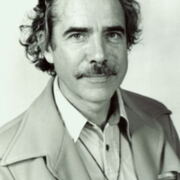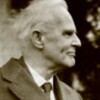Thomas J. J. Altizer (1927–2018)
Author of Radical Theology and the Death of God
About the Author
Thomas Jonathan Jackson Altizer was born in Cambridge, Massachusetts on May 28, 1927. During World War II, he enlisted in the Army, where he worked on radios for bombers. He received a bachelor's degree in 1948, a master's degree in theology in 1951, and a Ph.D. in history of religions in 1955 from show more the University of Chicago. He wanted to become an Episcopal priest but failed a psychiatric evaluation. He taught at Wabash College, Emory University, and the State University of New York at Stony Brook. As a theologian, he believed in the God is dead movement. He wrote around 20 books including Radical Theology and the Death of God written with William Hamilton, The Gospel of Christian Atheism, and Living the Death of God. He died from complications of a stroke on November 28, 2018 at the age of 91. (Bowker Author Biography) show less
Image credit: Cathedral Bells
Works by Thomas J. J. Altizer
The descent into hell;: A study of the radical reversal of the Christian consciousness (1979) 14 copies
The New Apocalypse: The Radical Christian Vision of William Blake (Series in Philosophical and Cultural Studies in… (2000) 11 copies
Associated Works
Journal of the American Academy of Religion, Winter 1989, Vol. LVII, No. 4 (1989) — Contributor — 2 copies
Theological Reflection and the Pursuit of Ideals: Theology, Human Flourishing and Freedom (2013) — Contributor — 1 copy
Tagged
Common Knowledge
- Legal name
- Altizer, Thomas Jonathan Jackson
- Birthdate
- 1927-05-28
- Date of death
- 2018-10-28
- Gender
- male
- Nationality
- USA
- Birthplace
- Charleston, West Virginia, USA
- Place of death
- Stroudsburg, Pennsylvania, USA
- Places of residence
- Port Jefferson, New York, USA
Mount Pocono, Pennsylvania, USA
Charleston, West Virginia, USA - Education
- University of Chicago (BA, MA - Theology, PhD - History of Religions)
St. John's College, Annapolis
Stonewall Jackson High School - Occupations
- theologian
- Organizations
- Wabash College
Emory University
State University of New York, Stony Brook
Members
Reviews
Awards
You May Also Like
Associated Authors
Statistics
- Works
- 29
- Also by
- 4
- Members
- 564
- Popularity
- #44,322
- Rating
- 3.6
- Reviews
- 7
- ISBNs
- 40
- Languages
- 2
- Favorited
- 1













A lucid, Joyous, wise, evangelical-- even pastoral --piece of theological work -William Hamilton